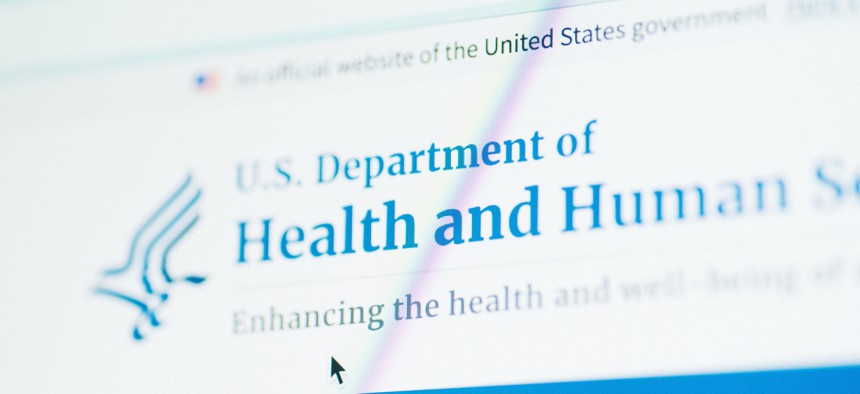
HHS officials have begun rescinding RIF notices for pockets of employees in various component agencies and offices, including ones hit hard by the initial layoffs, like the National Institute for Occupational Safety and Health. MarioGuti / Getty Images
HHS recalls some previously laid off worker safety employees
Elsewhere, the department is issuing new RIFs for each employee it brings back.
Hannah Echt was just weeks away from being unemployed due to a reduction in force when she received an unexpected email on Tuesday.
“You previously received a notice regarding the Department of Health and Human Services (HHS) upcoming reduction in force (RIF),” the notice read. “That notice is hereby revoked. You will not be affected by the upcoming RIF.”
That was the entire message. The Centers for Disease Control and Prevention opted to rescind upcoming layoffs for what seems to be hundreds of employees within the National Institute for Occupational Safety and Health. Echt called the decision “surprising,” and, ultimately, good news.
NIOSH Director John Howard confirmed the news in an email to staff Tuesday afternoon, saying it impacted “many” of the agency’s employees.
“We are pleased to see these NIOSH staff members brought back to continue the important work of the Institute,” said Howard, who had himself been part of the layoffs.
He added, however, that many employees are not slated to be brought back and this remains a “difficult time to navigate” for the agency.
“While we celebrate with those who received a rescission letter from HHS, I am mindful that others did not,” Howard said. “I am hopeful that we can continue to make the case for reinstating everyone at NIOSH.”
The agency was particularly hard hit in HHS’ layoffs of 10,000 employees in April, with more than 80% of its 1,100 employees receiving RIF notices. Additional staff received notices on May 2. Congress created NIOSH in 1970 to investigate outbreaks and illnesses within the workplace.
Its near elimination has been met with significant pushback from lawmakers in both parties, advocacy groups and state governments. Sen. Shelly Moore Capito, R-W.Va., has repeatedly pushed HHS Secretary Robert F. Kennedy Jr. to walk back the cuts and on Tuesday celebrated that around 100 employees at the agency’s Morgantown facility in her home state had permanently won their jobs back.
“The health and safety of our [West Virginia] workers, including our miners, is of the utmost importance and I will always advocate for their wellbeing,” Capito said, adding she was proud to advocate for the “critical work” the agency performs.
Those recalled, Howard said, included select units within the Office of the Director; the Respiratory Health Division; the Division of Safety Research; the Division of Compensation and Analysis Support; the National Personal Protective Technology Laboratory; and part of the Division of Field Studies and Surveillance.
After the employees received their notices on Tuesday, U.S. Judge Irene Berger for the Southern District of West Virginia ruled that HHS violated the law by ending the Coal Workers' Health Surveillance Program and mandated that all employees in NIOSH's Respiratory Health Division be reinstated.
Andrew Nixon, an HHS spokesperson, said the Trump administration was committed to supporting coal miners and firefighters. A National Firefighter Registry that tracks rates of cancer for those fighting fire was part of the original cuts, as was the Coal Workers’ Health Surveillance Program. Those programs will now continue.
“As the agency streamlines its operations, the essential services for these Americans provided by NIOSH will continue,” Nixon said. He declined to state exactly how many employees at NIOSH, or elsewhere, had been recalled.
The immediate next steps for impacted employees was unclear Tuesday. Echt, who spoke in her capacity as a union steward for the local American Federation of Government Employees chapter, said she had no idea when she was expected to report to work. The fourth and final sentence of the rescission notice said to contact her supervisor with questions, but as far as she knew her supervisor was still laid off.
“I’m totally clueless,” Echt said.
In addition to the Morgantown employees, Government Executive has learned staff in at least Pittsburgh and Cincinnati have received the recalls. The RIF rescissions appear unrelated to a court decision that has paused agency layoffs at most agencies for two weeks.
HHS is currently facing a lawsuit from 19 states that have argued the department had “no constitutional or statutory authority” to carry out the cuts. The American Industrial Hygiene Association, which advocates for scientists and professionals who ensure occupational and environmental health safety, vowed to fight against the reductions. Kennedy is scheduled to testify in the House on Wednesday and in the Senate—in a hearing Capito will chair—next week.
NIOSH appears to be the first HHS component to issue large-scale RIF rescissions, despite Kennedy previously suggesting around 25% of those laid off would be called back. The National Institutes of Health has recalled employees on a limited basis, according to an official there, but each person brought back required additional staff to receive RIFs so the total impacted would remain unchanged.
At NIOSH, Howard told employees in his note, which went out all staff, not just those recalled, that they should remain hopeful.
“Every one of you has made a significant and positive impact in the lives of workers across the nation,” Howard said. “Today we saw a recognition of the importance of much of our work and we continue to hope that we will see further actions that will allow us to continue to conduct the best science and service for all workers.”
How are these changes affecting you? Share your experience with us:
Eric Katz: ekatz@govexec.com, Signal: erickatz.28
NEXT STORY: Most major agencies must pause RIFs for at least two weeks, judge orders







